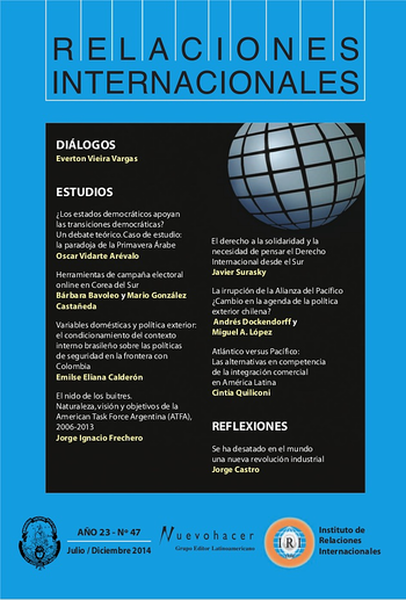La irrupción de la Alianza del Pacífico ¿Cambio en la agenda de la política exterior chilena?
Abstract
This paper takes a look at the foreign policy agenda of Chile in the context of the government action plan of candidates in 2009 and 2013. In broad terms, the agenda of this sector has been characterized by a high level of stability. However, with the right coming to power in 2010, certain issues in the agenda took precedence over others. It was in this context that Chile entered the Pacific Alliance. Until then, the change from one administration to another had not affected the balance between the core components of foreign policy. All in all, Chile’s involvement in this integration initiative was not a part of the government action plan of the right or the center-left. That is to say, it was not an alternative promoted by a public political community, as would follow from J. Kingdon’s agenda-setting theory (1995). The profile of the Pacific Alliance and the reaction caused by the country’s involvement with it in the political arena give credibility to the hypothesis that the change in the ruling faction generated a “polical window” for the country to join this initiative. All in all, as we conclude, Michelle Bachelet’s government action plan in 2013 was not aligned with Latin Americanist currents, but rather aimed at repositioning the axes of the foreign policy agenda that was in place before the Piñera administration.
Downloads
Downloads
Published
How to Cite
Issue
Section
License
Aquellos autores/as que tengan publicaciones con esta revista, aceptan los términos siguientes:
- Los autores/as conservarán sus derechos de autor y garantizarán a la revista el derecho de primera publicación de su obra. A partir de noviembre del 2020 los artículos se publicarán en la revista bajo una licencia Creative Commons Atribución- NoComercial-CompartirIgual 4.0 Internacional (CC BY-NC-SA 4.0). Acorde a estos términos, el material se puede compartir (copiar y redistribuir en cualquier medio o formato) y adaptar (remezclar, transformar y crear a partir del material otra obra), siempre que a) se cite la autoría y la fuente original de su publicación (revista y URL de la obra), b) no se use para fines comerciales y c) se mantengan los mismos términos de la licencia.
Previo a esta fecha los artículos se publicaron en la revista bajo una Licencia de reconocimiento de Creative Commons (BY-SA 2.5). - Los autores/as podrán adoptar otros acuerdos de licencia no exclusiva de distribución de la versión de la obra publicada (p. ej.: depositarla en un archivo telemático institucional o publicarla en un volumen monográfico) siempre que se indique la publicación inicial en esta revista.
- Se permite y recomienda a los autores/as difundir su obra a través de Internet (p. ej.: en archivos telemáticos institucionales o en su página web) antes y durante el proceso de envío, lo cual puede producir intercambios interesantes y aumentar las citas de la obra publicada. (Véase El efecto del acceso abierto).


























